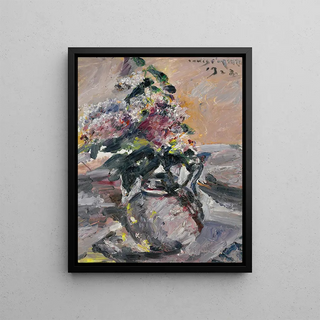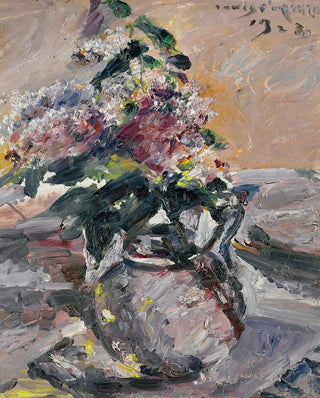Art print | Lilacs in a glass jug Lilacs in a glass jug - Lovis Corinth


View from behind

Frame (optional)
In the fascinating world of modern painting, the art print "Lilacs in a Glass Jug" by Lovis Corinth stands out for its delicacy and depth. This floral composition, imbued with a unique sensitivity, evokes not only the fleeting beauty of nature but also a reflection on light and color. Gazing at this piece, the viewer is instantly transported to a space where time seems suspended, allowing for a complete immersion in the harmony of shades and shapes. The depiction of lilacs, with their intoxicating scent, then becomes a metaphor for the ephemeral beauty of life.
Style and uniqueness of the art print
Lovis Corinth, master of post-impressionist painting, manages to capture the very essence of flowers in this work. The lilacs, painted with bold technique, reveal a rich and vibrant texture that invites contemplation. The light, subtly orchestrated, plays a crucial role in the composition, creating delicate shadows that emphasize the three-dimensionality of the flowers. Each brushstroke appears charged with emotion, bearing witness to an almost tactile approach to painting. The glass jug, meanwhile, adds an extra dimension to the piece, its transparency reflecting light and creating a dialogue between the object and the subject. This marriage between nature and artifice reveals a duality at the heart of Corinth's artistic approach, where everyday life transforms into an unforgettable aesthetic experience.
The artist and his influence
Lovis Corinth, born in 1858 in Tapiau in Prussia, is an iconic figure of the German art scene. His career, marked by diverse influences ranging from realism to impressionism, allows him to develop a personal style, rich in nuances and emotions. Corinth does not merely reproduce reality; he seeks to express his feelings through color and light. This quest for authenticity is reflected in "Lilacs in a Glass Jug," where each element is charged with meaning. Beyond his work, Corinth also played a vital role in shaping generations of artists, passing on his expertise and

Matte finish

View from behind

Frame (optional)
In the fascinating world of modern painting, the art print "Lilacs in a Glass Jug" by Lovis Corinth stands out for its delicacy and depth. This floral composition, imbued with a unique sensitivity, evokes not only the fleeting beauty of nature but also a reflection on light and color. Gazing at this piece, the viewer is instantly transported to a space where time seems suspended, allowing for a complete immersion in the harmony of shades and shapes. The depiction of lilacs, with their intoxicating scent, then becomes a metaphor for the ephemeral beauty of life.
Style and uniqueness of the art print
Lovis Corinth, master of post-impressionist painting, manages to capture the very essence of flowers in this work. The lilacs, painted with bold technique, reveal a rich and vibrant texture that invites contemplation. The light, subtly orchestrated, plays a crucial role in the composition, creating delicate shadows that emphasize the three-dimensionality of the flowers. Each brushstroke appears charged with emotion, bearing witness to an almost tactile approach to painting. The glass jug, meanwhile, adds an extra dimension to the piece, its transparency reflecting light and creating a dialogue between the object and the subject. This marriage between nature and artifice reveals a duality at the heart of Corinth's artistic approach, where everyday life transforms into an unforgettable aesthetic experience.
The artist and his influence
Lovis Corinth, born in 1858 in Tapiau in Prussia, is an iconic figure of the German art scene. His career, marked by diverse influences ranging from realism to impressionism, allows him to develop a personal style, rich in nuances and emotions. Corinth does not merely reproduce reality; he seeks to express his feelings through color and light. This quest for authenticity is reflected in "Lilacs in a Glass Jug," where each element is charged with meaning. Beyond his work, Corinth also played a vital role in shaping generations of artists, passing on his expertise and






